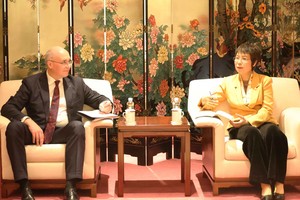HONG KONG, Aug 17, 2011 (AFP) - The euro suffered in early Asian trading Wednesday after summit talks between France and Germany failed to quell intense concerns about the future of the 17-nation eurozone.
Shares in Tokyo, Asia's biggest stock market, slipped at the opening, hurt also by data showing a sharp slowdown in Germany's economic growth and after Wall Street ended a three-day winning streak.
"The French-German meeting did not provide any clear solutions, and this has incited more euro selling," said Nobuyoshi Kuroiwa, senior deputy general manager at Hachijuni Bank's forex team in Tokyo.
The euro bought $1.4359 around 0130 GMT after dipping at one point to $1.4352, compared with $1.4406 in New York overnight.
The euro also fetched 110.18 yen against 110.67 yen in New York and 110.41 yen in Tokyo on Tuesday.
French President Nicolas Sarkozy and German Chancellor Angela Merkel vowed late Tuesday to give the eurozone bloc a "true economic government", but experts said their pledges were not enough to defuse the region's debt crisis.
Speaking after the talks in Paris, the leaders said they would propose an EU-wide tax on financial transactions and seek to create a eurozone governing body headed by European Union president Herman van Rompuy.
But the pair disappointed many by not backing the idea of issuing "eurobonds" to pool the debts of the 17 eurozone members, and by insisting the bloc's existing 440-billion-euro ($634 billion) bailout fund was "sufficient".
Instead, the leaders said member states would be held to a tougher fiscal standard and new cross-border controls put in place.
"This will inevitably raise the appeal of safe-haven currencies like the Japanese yen and Swiss franc," Kuroiwa said.
The dollar changed hands at 76.73 yen early Wednesday against 76.75 yen in New York and 76.74 yen in Tokyo Tuesday.
The Swiss franc, whose rapid appreciation has sparked talk of extraordinary policy intervention by the authorities in Switzerland, was worth 0.7938 per dollar from 0.7935 in New York and 0.7844 in Tokyo.
The Nikkei index at the Tokyo Stock Exchange opened 0.65 percent, or 59.54 points lower at 9,047.89. The Topix index fell 0.47 percent or 3.68 points to 775.38.
"Concerns about a slowdown in both Europe and in the United States continue to be at the core of investors' minds," Yutaka Miura, a senior technical analyst at Mizuho Securities, told Dow Jones Newswires.
Wall Street closed down overnight as the Dow Jones Industrial Average ended its three-day rally, dropping 76.97 points (0.67 percent) to finish at 11,405.93.
Apart from the eurozone summit, US investors were also disappointed by the news that Germany saw only 0.1 percent growth in the second quarter and the eurozone's output expanded a meagre 0.2 percent.
Analysts said governments were now in the worst of both worlds, trying to cut debt by slashing spending and raising taxes, a double squeeze that kills growth and further complicates efforts to stabilize public finances.
European markets closed prior to the end of the Sarkozy-Merkel summit. London and Zurich were the only majors to finish in positive territory Tuesday.
Mizuho's Miura predicted that Japanese shares may fall below the psychologically important 9,000 mark if the dollar weakens further against the yen during Tokyo trading hours.
In South Korea, the KOSPI index opened 0.59 percent lower at 1,868.85 a day after rallying nearly five percent.
But elsewhere, Hong Kong's Hang Seng Index shrugged off the global pall to open 0.63 percent higher at 20,338.68 and Australian stocks gained 0.21 percent to 4,255.5. Analysts said the eurozone summit was already priced in.
Gold opened in Hong Kong at $1,785.00-$1,786.00 an ounce, up on its Tuesday close of $1,779.50-$1,780.50.
Oil was higher, but traders said sentiment was subdued after the disappointing eurozone meet.
New York's main contract, West Texas Intermediate light sweet crude for September delivery was up 17 cents to $86.82 a barrel, while Brent North Sea crude for October rose 10 cents to $109.23.
























